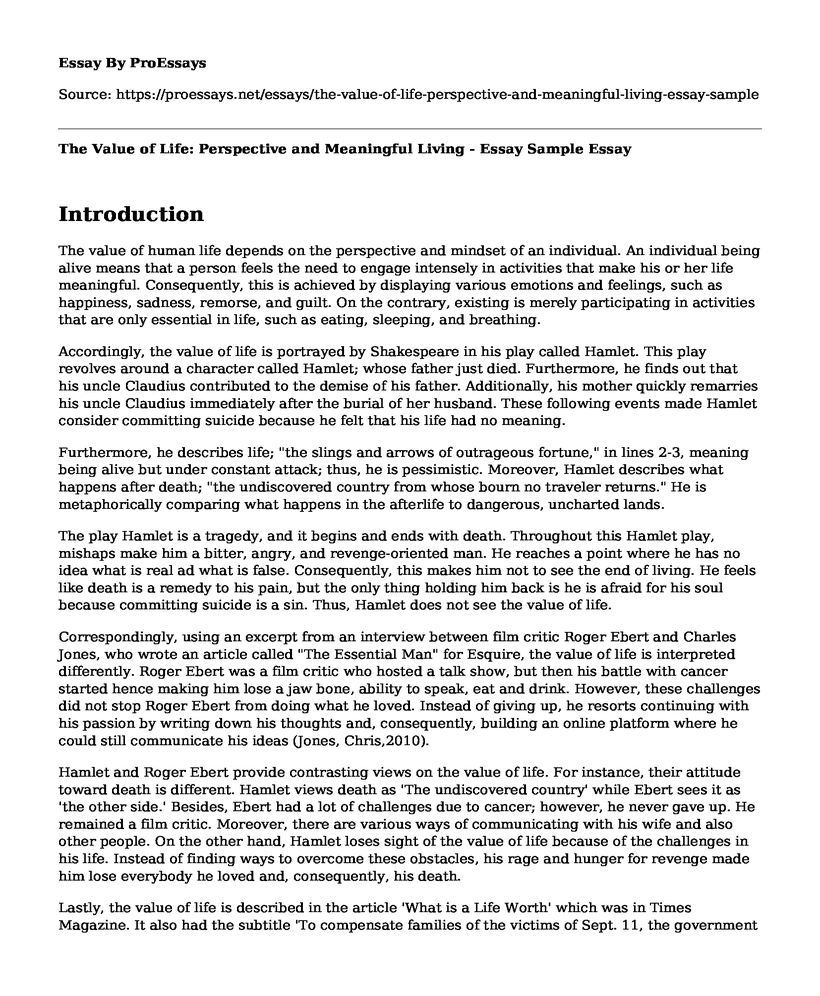Introduction
The value of human life depends on the perspective and mindset of an individual. An individual being alive means that a person feels the need to engage intensely in activities that make his or her life meaningful. Consequently, this is achieved by displaying various emotions and feelings, such as happiness, sadness, remorse, and guilt. On the contrary, existing is merely participating in activities that are only essential in life, such as eating, sleeping, and breathing.
Accordingly, the value of life is portrayed by Shakespeare in his play called Hamlet. This play revolves around a character called Hamlet; whose father just died. Furthermore, he finds out that his uncle Claudius contributed to the demise of his father. Additionally, his mother quickly remarries his uncle Claudius immediately after the burial of her husband. These following events made Hamlet consider committing suicide because he felt that his life had no meaning.
Furthermore, he describes life; "the slings and arrows of outrageous fortune," in lines 2-3, meaning being alive but under constant attack; thus, he is pessimistic. Moreover, Hamlet describes what happens after death; "the undiscovered country from whose bourn no traveler returns." He is metaphorically comparing what happens in the afterlife to dangerous, uncharted lands.
The play Hamlet is a tragedy, and it begins and ends with death. Throughout this Hamlet play, mishaps make him a bitter, angry, and revenge-oriented man. He reaches a point where he has no idea what is real ad what is false. Consequently, this makes him not to see the end of living. He feels like death is a remedy to his pain, but the only thing holding him back is he is afraid for his soul because committing suicide is a sin. Thus, Hamlet does not see the value of life.
Correspondingly, using an excerpt from an interview between film critic Roger Ebert and Charles Jones, who wrote an article called "The Essential Man" for Esquire, the value of life is interpreted differently. Roger Ebert was a film critic who hosted a talk show, but then his battle with cancer started hence making him lose a jaw bone, ability to speak, eat and drink. However, these challenges did not stop Roger Ebert from doing what he loved. Instead of giving up, he resorts continuing with his passion by writing down his thoughts and, consequently, building an online platform where he could still communicate his ideas (Jones, Chris,2010).
Hamlet and Roger Ebert provide contrasting views on the value of life. For instance, their attitude toward death is different. Hamlet views death as 'The undiscovered country' while Ebert sees it as 'the other side.' Besides, Ebert had a lot of challenges due to cancer; however, he never gave up. He remained a film critic. Moreover, there are various ways of communicating with his wife and also other people. On the other hand, Hamlet loses sight of the value of life because of the challenges in his life. Instead of finding ways to overcome these obstacles, his rage and hunger for revenge made him lose everybody he loved and, consequently, his death.
Lastly, the value of life is described in the article 'What is a Life Worth' which was in Times Magazine. It also had the subtitle 'To compensate families of the victims of Sept. 11, the government has invented a way to measure blood and loss in cash. A look at the wrenching calculus'. In the article, there are various determinants the government used to show the value of life is when compensating the family of the deceased. Money assistance depended on the individuals' source of income. Therefore, when comparing a lawyer to a janitor, a janitor would be given fewer funds compared to the lawyer. Consequently, this made it easy for people to assume that lawyer's life was more valuable and worth than a janitor's (Ripley, Amanda, 2002).
The notion of allocating a price on a person's life is not acceptable. Money cannot be used to measure a person's worth; moreover, it cannot be used to bring families together. Consequently, this is because nobody has more worth than another person and also, money brings about division than togetherness.
Conclusion
In conclusion, suffering and illness can impact how valuable life. The main reason is in Hamlet's story, due to his father's death and the incidents that followed, it made him lose the essence of living. Thus, he ended being a bitter and spiteful person, and on the other hand, Roger Ebert's illness made him appreciate his life; thus, he strived to achieve more in life because he knew he did not have a long time left to live. Therefore, money does not add value to a person's life; however, what can add value is the care and love from family and friends.
Reference
A Human Life Value Calculator. Web. Shakespeare, William. Hamlet. Act III, Sc. 1: Hamlet's "To be, or not to be" soliloquy
Jones, Chris. "Roger Ebert: The Essential Man." Esquire (2010).
Ripley, Amanda, Nadia Mustafa, and Julie Rawe. "What Is a Life Worth?." Time Magazine (2002).
Cite this page
The Value of Life: Perspective and Meaningful Living - Essay Sample. (2023, Mar 20). Retrieved from https://proessays.net/essays/the-value-of-life-perspective-and-meaningful-living-essay-sample
If you are the original author of this essay and no longer wish to have it published on the ProEssays website, please click below to request its removal:
- Personal Nursing Philosophy
- Wisdom Is Pursued: Socrates and Oracle Paper Example
- Ethical and Moral Practices of Doing Business in Europe Paper Example
- Ethics Training Programs: Instilling Right Morals in Organizations - Essay Sample
- Paper on Moral Principles: Impact on Society and Individuals
- Emerging Technologies and Ethical Concerns - Essay Example
- Compare and Contrast Utilitarianism and Deontological theories







